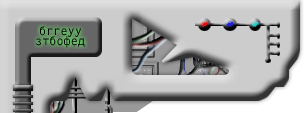|
Babbage,
Charles (1792-1871), British mathematician and inventor, who designed and built mechanical computing machines on principles
that anticipated the modern electronic computer. Babbage was born in Teignmouth, Devonshire,
and was educated at the University
of Cambridge. He became a fellow
of the Royal Society in 1816 and was active in the founding of the Analytical, the Royal Astronomical, and the statistical
societies.
In the 1820s Babbage began developing
his Difference Engine, a mechanical device that can perform simple mathematical calculations. Babbage started to build his
Difference Engine, but was unable to complete it because of a lack of funding. However, in 1991 British scientists, following
Babbage's detailed drawings and specifications, constructed the Difference Engine. The machine works flawlessly, calculating
up to a precision of 31 digits, proving that Babbage's design was sound. In the 1830s Babbage began developing his Analytical
Engine, which was designed to carry out more complicated calculations, but this device was never built. Babbage's book Economy
of Machines and Manufactures (1832) initiated the field of study known today as operational research.
|

